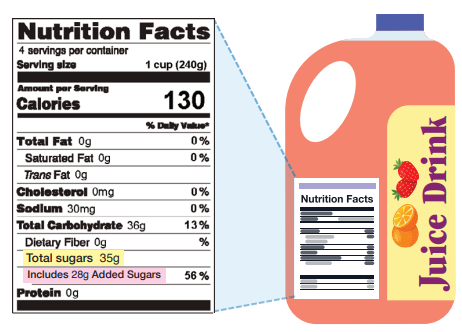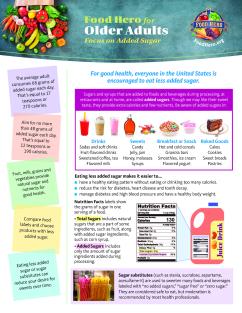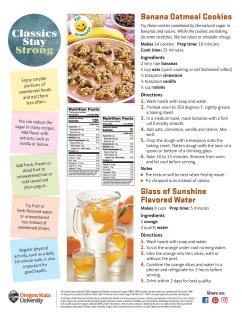Focus on Added Sugar
For good health, everyone in the United States is encouraged to eat less added sugar.
Sugars and syrups that are added to foods and beverages during processing, at restaurants and at home, are called added sugars. Though we may like their sweet taste, they provide extra calories and few nutrients. Be aware of added sugars in:
- Drinks: Sodas and soft drinks, fruit-flavored drinks, sweetened coffee and tea, flavored milk
- Sweets: Candy, jelly, jam, honey, molasses, syrups
- Breakfast or Snack: Hot and cold cereals, granola bars, smoothies, ice cream, flavored yogurt
- Baked Goods: Cakes, cookies, sweet breads, pastries
Eating less added sugar makes it easier to:
- have a healthy eating pattern without eating or drinking too many calories.
- reduce the risk for diabetes, heart disease and tooth decay.
- manage diabetes and high blood pressure and have a healthy weight.
Nutrition Facts labels show the grams of sugar in one serving of a food.
- Total Sugars includes natural sugars that are part of some ingredients, such as fruit, along with added sugar ingredients, such as corn syrup.
- Added Sugars includes only the amount of sugar ingredients added during processing.
More about Added Sugar
- The average adult consumes 68 grams of added sugar each day. That’s equal to 17 teaspoons or 270 calories.
- Aim for no more than 48 grams of added sugar each day. That's equal to 12 teaspoons or 190 calories.
- Fruit, milk, grains and vegetables provide natural sugar and nutrients for good health.
- Compare food labels and choose products with less added sugar.
- Eating less added sugar or sugar substitutes can reduce your desire for sweets over time.
Sugar substitutes (such as stevia, sucralose, aspartame, acesulfame-K) are used to sweeten many foods and beverages labeled with "no added sugars," "sugar free" or "zero sugar." They are considered safe to eat, but moderation is recommended by most health professionals.
Classics Stay Strong
- Enjoy smaller portions of sweetened foods and eat them less often.
- You can reduce the sugar in many recipes. Add flavor with extracts, such as vanilla or lemon.
- Add fresh, frozen or dried fruit to unsweetened hot or cold cereal and plain yogurt.
- Try fruit or herb-flavored water or unsweetened tea instead of sweetened drinks.
- Regular physical activity, such as a daily 10-minute walk, is also important for good health.




